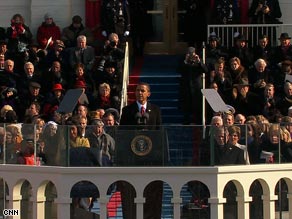 I couldn’t resist the opportunity to blog about today’s historic inauguration of Barack Obama. If I didn’t, I might regret it later. Of course, with that said, all inaugurations are historic, just for different reasons. Anyhow, here are some of my “historic” observations…
I couldn’t resist the opportunity to blog about today’s historic inauguration of Barack Obama. If I didn’t, I might regret it later. Of course, with that said, all inaugurations are historic, just for different reasons. Anyhow, here are some of my “historic” observations…
Twittering the Inauguration: Last week I was having lunch with my church history professor, Dr. Paul Rorem, and some students from my Pseud0-Dionysius class. We were talking about our different plans for watching the inauguration, and so I mentioned that I would most likely be both watching and “tweeting” it with 30 or 40 of my closest twitter friends (which I did). It was an interesting conversation, and I’ll blog more about it later this week, but for today, suffice it to say that the inauguration confirmed a theory I’ve been working on about Twitter as Scholia — basically a running commentary on important events in our culture and society, not unlike the notes that medieval monks and theologians wrote in the margins of scriptures and other important texts.
Grady and Presidential “Powers”: Walking my four-year-old son to school this morning, I brought up the subject of the inauguration, since during the election he had announced his support for ‘Arack Obama (despite my own preferences). He still likes Barack Obama, but I’m not sure he has that much of a grasp on what exactly a president is. So I thought I would help clarify with a little analogy:
DADDY: Do you remember the character Ajihad, in the book we’re reading (Christopher Paolini’s Eragon)?
GRADY: Yes, Daddy. He’s the leader of the Varden.
DADDY: Ok, that’s kind of like a President. Barack Obama is our country’s new leader, like Ajihad was for the Varden.
GRADY: Oh. [thinks about it some] So what does Barack Obama fight with, then?
And that’s how you can tell you’ve been reading too many fantasy novels to your son (if that’s possible). Still, I should have told him the President fights with a magic spell book called “The Constitution,” and with a sword called “The Executive Order.” I hear it can slice a Congressman in half with a single stroke. Oh, and let’s not forget the shield of “Presidential Privilege” and the helmet of “Plausible Deniability.” Didn’t work so well for Nixon, but Reagan and Bush seemed to have wielded them often enough…
Obama’s Speech: There was much to like in Obama’s inauguration speech, but I didn’t think he “hit it out of the park.” Perhaps because everyone was comparing him to JFK and MLK, I was expecting more. Kennedy’s inauguration speech and MLK’s “I Have a Dream” speech still send shivers up my spine. Obama’s speech was good, and he delivered it well, but it won’t go down in history as one of the great speeches of all time. His speech during the campaign about race, on the other hand, actually might.
Here’s the part of today’s speech I liked best:
To the people of poor nations, we pledge to work alongside you to make your farms flourish and let clean waters flow; to nourish starved bodies and feed hungry minds. And to those nations like ours that enjoy relative plenty, we say we can no longer afford indifference to suffering outside our borders; nor can we consume the world’s resources without regard to effect. For the world has changed, and we must change with it.
I hope he can keep that pledge, and that congress will help him do it. I also like that he called on all those who “enjoy relative plenty” to join in the effort. I think we could do no better than to start with our neighbor to the immediate south, Mexico. I noticed that he didn’t say anything about immigration reform, but that’s not too surprising — Bush saw the border as a “homeland security” issue, but Obama’s speech overall gives me hope he’ll see it through the more compassionate lens of “love for neighbor.”
Here’s my least favorite part of the speech:
We will not apologize for our way of life, nor will we waver in its defense, and for those who seek to advance their aims by inducing terror and slaughtering innocents, we say to you now that our spirit is stronger and cannot be broken; you cannot outlast us, and we will defeat you.
Sometimes I do think we should apologize for our American way of life — especially when it involves invading innocent countries because we “suspect” them of terrorism, or polluting the environment to assuage our rampant consumerism. And let’s not forget that we, too, are guilty of slaughtering millions of innocents. I would have been more comfortable if he had said “we will defeat you with our ideals, our integrity, and commitment to justice.” But he didn’t. He just ended that paragraph there, letting Conservative hawks assume he meant, “If you mess with America, we’ll still kick your ass.” And who knows? Maybe that’s exactly what he meant. Considering what I read my son, I’m probably not one to judge.
The overall tone of the speech, continuing themes from his campaign, was one of reconciliation and hope. And I certainly think he’s an improvement over our last president. Obama’s election and inauguration are long deserved triumphs for African-Americans and indeed all Americans on the frontier of race. But at the end of the day, I must remind myself (and everyone else) that he’s not a savior, not a messiah. Just a man, confined within the limits of a two-party system, an enormous bureaucracy, and a plethora of special interest groups. I hope he can navigate all of these things well, and I don’t mind being pleasantly surprised. So congratulations to the USA, and to you, President Obama. I will earnestly place my hope in you, but (I hope you’ll understand) not my faith. In fact, I think we’d be a little better off if all of us placed a little more hope in our country, and a little less faith.
God Bless America? I found it fascinating that Rick Warren led the nation in the inaugural prayer, and that Bishop TD Jakes preached the private inaugural sermon this morning. Sadly, the ministerial voice most absent was the one I find myself most often in agreement with: Jeremiah Wright. I hope Obama’s rejection of Wright, and turn to these two more conservative pastors is not a preview of changing beliefs or politics. I understand the political expediency that required Obama to distance himself from Wright, but I hope the reconciliation in the air extends to Obama’s long-time pastor, too. Jeremiah Wright got fried over a brief clip from a sermon that was taken entirely out of context. But I think my closing sentiments echo his true message a bit better: May God Bless America: South America…Central America… Mexico…Canada… And may the United Sates of America stop worrying so much about getting blessed, and start worrying about how we can bless those around us. Despite Wright’s absence, I sensed his influence in parts of Obama’s speech. And so, I too, have hope today.









 I couldn’t resist the opportunity to blog about today’s historic inauguration of Barack Obama. If I didn’t, I might regret it later. Of course, with that said, all inaugurations are historic, just for different reasons. Anyhow, here are some of my “historic” observations…
I couldn’t resist the opportunity to blog about today’s historic inauguration of Barack Obama. If I didn’t, I might regret it later. Of course, with that said, all inaugurations are historic, just for different reasons. Anyhow, here are some of my “historic” observations…